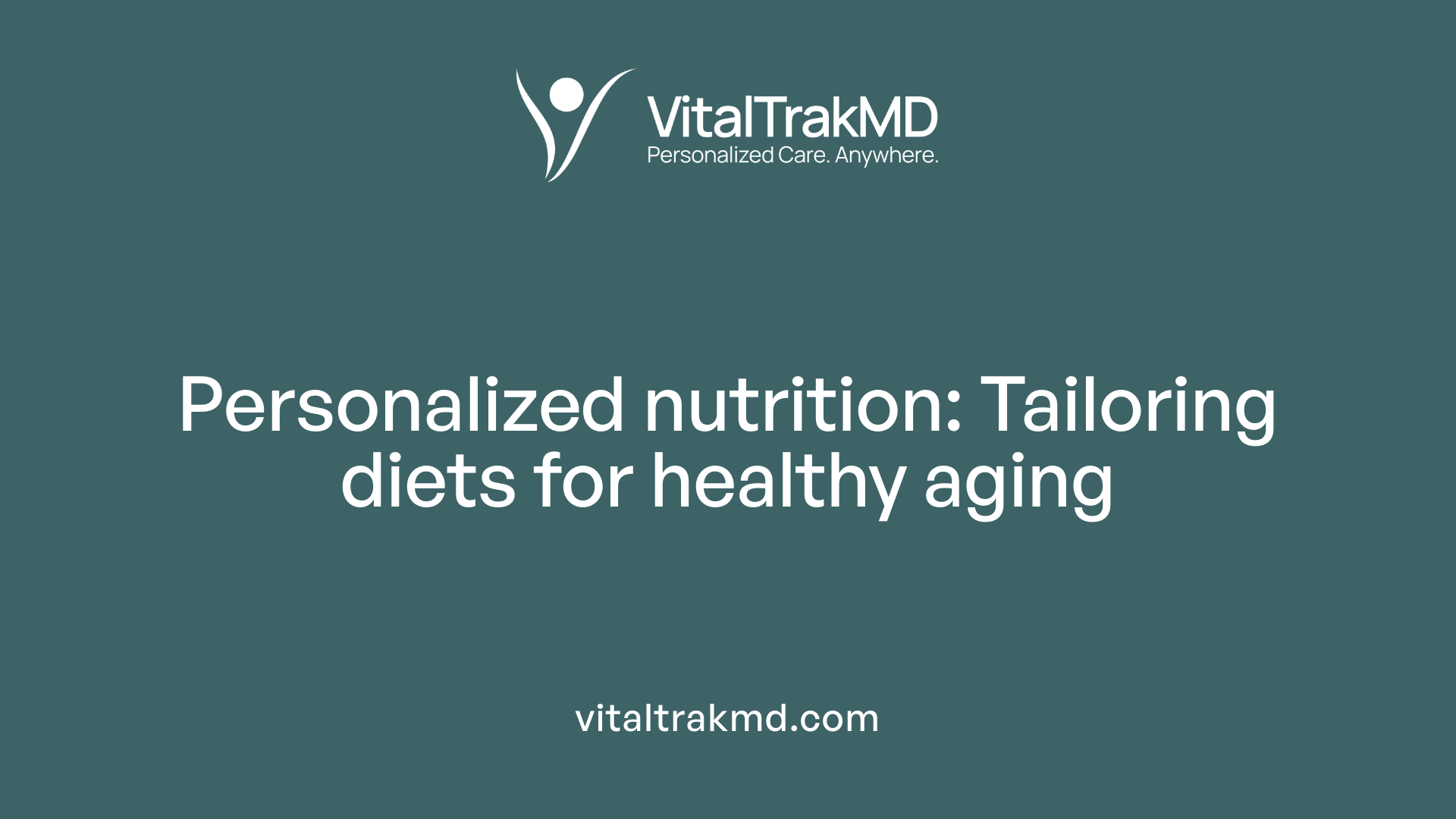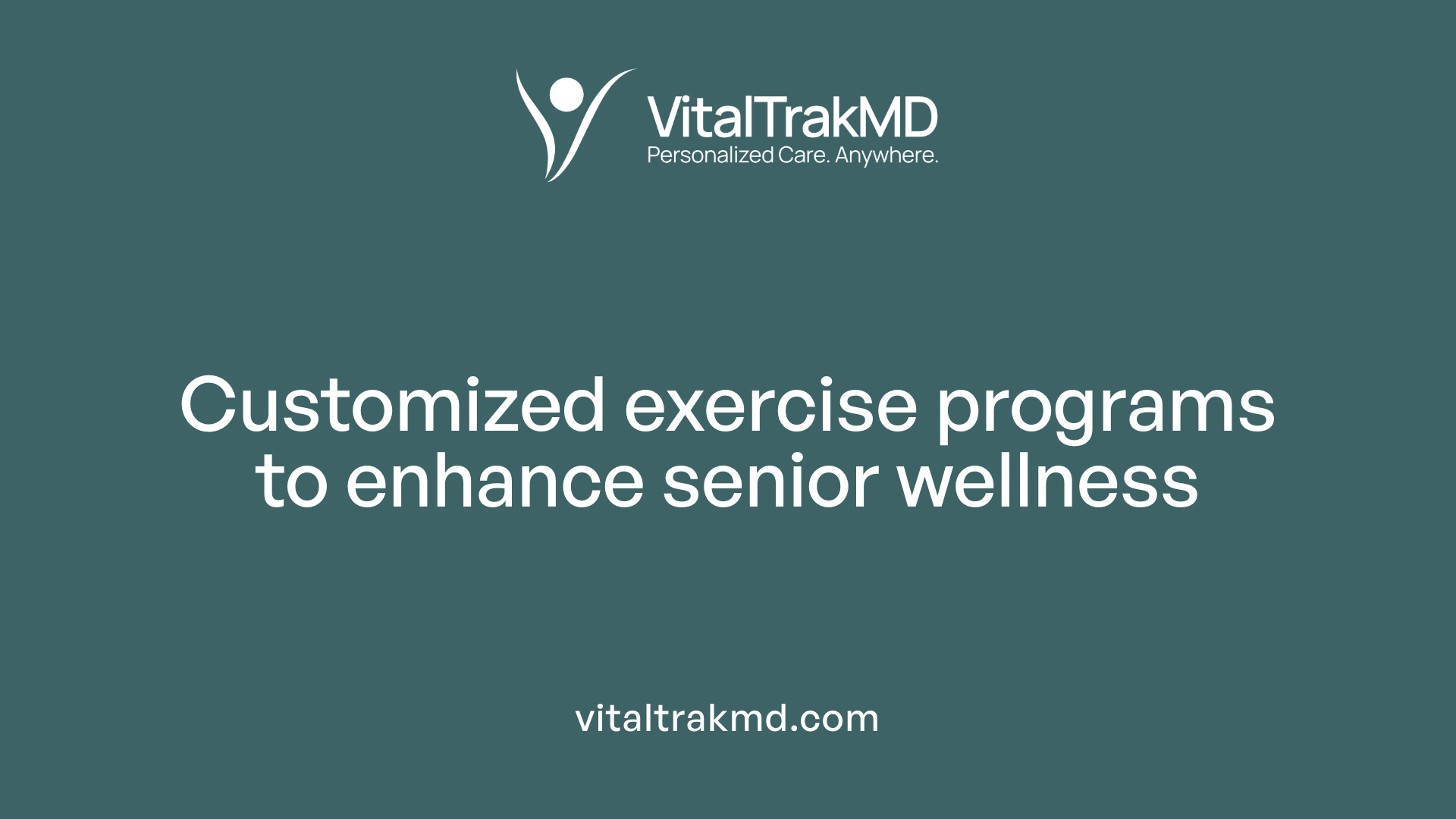Addressing Senior Nutritional Deficiencies Through Personalized Plans

The Growing Importance of Tailored Nutritional Care for Seniors
As the population ages, ensuring optimal nutrition for seniors becomes increasingly critical. Age-related physiological changes and chronic conditions contribute to nutritional challenges that impact health, mobility, and quality of life. Personalized nutrition plans and supervised wellness programs are vital to address these unique needs effectively, promoting independence and preventing malnutrition and disease.
Understanding Age-Related Nutritional Challenges

How do physiological changes impact metabolism and appetite in older adults?
As people age, their metabolism naturally slows down, leading to a reduced need for calories but an increased demand for nutrient-dense foods. This slower metabolism can make weight management more challenging and requires careful dietary planning. Additionally, changes in appetite often occur due to diminished taste and smell senses, with up to 60% of seniors experiencing a decline in taste, which can reduce food intake.
What are common nutrient deficiencies among older adults?
Older adults frequently face deficiencies in vital nutrients such as calcium, vitamin D, vitamin B12, iron, and magnesium. Calcium and vitamin D needs rise significantly after age 70 to prevent osteoporosis. Moreover, vitamin B12 absorption decreases because of reduced stomach acid, sometimes necessitating supplementation. These deficits can impact bone health, immunity, and cognitive function.
How do sensory and digestive alterations affect food intake and nutrient absorption?
Sensory changes, including decreased taste and smell, cause reduced appetite and interest in food. Digestive efficiency also declines, particularly affecting the absorption of protein and vitamin B12. This digestive change can contribute to muscle loss and weakened immune response if not properly managed through diet and supplementation.
In what ways do dental issues and chronic diseases influence nutrition in seniors?
Dental problems and chewing difficulties often limit food choices, sometimes leading to inadequate nutrition. Chronic medical conditions like diabetes, heart disease, and renal impairment further complicate nutritional management, demanding personalized dietary strategies.
Maintaining proper nutrition in the face of these challenges is essential for supporting independence, mobility, and overall quality of life in older adults.
The Role of Personalized Nutrition Plans in Senior Health

Incorporating Lean Proteins, Vitamins, Minerals, and Fiber Tailored to Individual Needs
Personalized nutrition plans for seniors emphasize lean proteins to help prevent muscle loss and support immune function. Essential vitamins and minerals like calcium, vitamin D, and vitamin B12 are carefully included to address common deficiencies that affect bone health, cognition, and overall well-being. Fiber intake is also prioritized to combat constipation, which affects nearly 30% of older adults, thereby promoting digestive health.
Adjusting Calorie Intake in Line with Slowed Metabolism
As metabolism slows with age, the calorie needs of seniors decrease, but the demand for nutrient-dense foods increases. Personalized plans balance calorie intake to avoid both undernutrition and overnutrition, favoring whole foods rich in nutrients. This approach supports weight management while ensuring seniors receive adequate nutrition for their changing physiological needs.
Addressing Calcium, Vitamin D, and B12 Deficiencies
Older adults require higher amounts of calcium and vitamin D, especially after age 70, to maintain bone density and reduce osteoporosis risk. Vitamin B12 absorption declines due to decreased stomach acid, making supplementation or fortified foods necessary components of many senior diets. Tailored nutrition plans incorporate these adjustments to prevent long-term health complications.
The Importance of Hydration and Creative Strategies to Improve Fluid Intake
Hydration is vital for seniors, who often experience diminished thirst perception leading to dehydration. Personalized plans encourage fluid intake through water, water-rich foods like fruits and vegetables, and creative options such as flavored waters and smoothies. Proper hydration supports kidney function, cognition, and reduces fall risk, enhancing overall health.
| Nutrient | Importance for Seniors | Strategy in Personalized Plans |
|---|---|---|
| Lean Protein | Prevents muscle loss, supports immune function | Incorporate poultry, fish, legumes with each meal |
| Calcium & Vitamin D | Maintains bone density, prevents osteoporosis | Include dairy, fortified foods, supplements as needed |
| Vitamin B12 | Supports cognitive function and red blood cell health | Use fortified foods and consider supplements |
| Fiber | Helps prevent constipation and supports digestion | Emphasize whole grains, fruits, vegetables |
| Fluids | Prevents dehydration and supports kidney & brain health | Encourage water, hydrating foods, flavored beverages |
Customized nutrition plans empower seniors to address their unique physiological shifts safely and effectively, promoting healthier aging and improved quality of life.
Medically Supervised Weight Loss Programs: Safety and Effectiveness

What Are the Most Effective Wellness Programs for Weight Loss?
Effective weight loss programs combine several elements to address the complexities of aging. For seniors, these programs integrate calorie-controlled, balanced nutrition emphasizing lean proteins, fiber, healthy fats, and vital vitamins like calcium and vitamin D. They avoid crash diets, which can be harmful and unsustainable.
Exercise is an essential component, focusing on low-impact activities such as walking, aquatic fitness, yoga, and tailored resistance training. These support cardiovascular health, maintain muscle mass, and improve mobility.
Behavioral strategies like portion control, mindful eating, emotional support, and accountability coaching help sustain positive lifestyle changes. Long-term success is boosted by personalized plans that adapt to individual medical conditions, metabolic changes, and medication interactions.
Why Is Medical Supervision Important?
Medical supervision is crucial to ensure safety during weight loss for older adults. A healthcare professional can carefully evaluate existing chronic conditions, potential side effects of medications, and unique metabolic and functional changes in seniors. This oversight helps avoid complications and aligns weight loss goals with overall health.
How Should Nutrition Be Approached?
Balanced nutrition is key—seniors require nutrient-dense foods that match their reduced caloric needs but elevated nutritional demands. Crash diets are discouraged as they often lack essential nutrients and can worsen muscle loss or chronic conditions.
What Makes Long-Term Weight Management Effective for Seniors?
Personalized, non-invasive programs focusing on gradual changes are more effective and safer than general, one-size-fits-all approaches. These programs provide ongoing monitoring and support, adjusting nutrition and activity plans as needed to maintain health and independence.
| Aspect | Description | Benefit for Seniors |
|---|---|---|
| Balanced Nutrition | Emphasizes lean proteins, fiber, healthy fats, vitamins | Supports metabolism and muscle preservation |
| Low-Impact Exercise | Walking, aquatic fitness, yoga, resistance training | Improves mobility, cardiovascular and bone health |
| Behavioral Support | Emotional encouragement, accountability coaching | Sustains habits and motivation |
| Medical Supervision | Regular health monitoring and personalized adjustments | Ensures safety considering medications and conditions |
| Long-Term Focus | Gradual, consistent lifestyle changes | Promotes lasting weight management and wellbeing |
Physical Activity: Tailoring Exercise for Senior Wellness

What types of exercises are recommended for seniors?
Low-impact exercises are ideal for older adults to support weight management and overall wellness. Common activities include walking, aquatic fitness, yoga, and resistance training. These exercises are gentle on the joints while promoting cardiovascular health and muscle engagement.
How does regular physical activity benefit older adults?
Engaging in consistent physical activity improves cardiovascular health, increases muscular strength, enhances flexibility, and boosts bone density. This comprehensive improvement helps seniors maintain independence, supports healthy weight management, and ultimately elevates quality of life.
Why is exercise customization important for seniors?
Older adults have varying ability levels and unique medical considerations such as chronic conditions or mobility limitations. Tailoring exercise programs ensures safety and effectiveness. Personalized plans can address individual needs, maximizing benefits while minimizing injury risks.
How does exercise support mobility and reduce fall risk?
Function-enhancing activities that focus on balance, strength, and flexibility help seniors preserve mobility. Improved muscle mass and bone density contribute to greater stability, reducing the likelihood of falls. This is critical for older adults to maintain independence and prevent injuries related to falls.
Integrating Behavioral and Emotional Support in Nutrition and Weight Management

What role does mental health play in successful weight loss and wellness programs?
Mental health significantly impacts motivation, adherence, and resilience during weight loss and wellness journeys. Conditions such as depression, anxiety, and low self-esteem can reduce commitment to healthy behaviors and increase vulnerability to emotional eating. Conversely, strong mental wellbeing boosts motivation, helping older adults sustain beneficial lifestyle changes.
Addressing depression, anxiety, and emotional eating
For seniors, psychological challenges often create barriers to maintaining balanced nutrition and consistent exercise. Emotional eating, often triggered by negative feelings, can lead to unhealthy weight fluctuations. Recognizing and addressing these issues through professional counseling or peer support helps tackle emotional obstacles linked to eating habits.
Behavioral strategies like portion control and mindful eating
Practical approaches such as portion control and mindful eating empower seniors to make sustainable dietary changes. Mindful eating encourages awareness of hunger cues and food choices, helping prevent overeating. Portion control aids in balancing calorie intake with nutritional needs, which is critical given age-related metabolic changes.
Importance of accountability, coaching, and peer support
Ongoing coaching and accountability mechanisms—including regular check-ins and group support—provide encouragement and reinforce positive habits. Emotional support from peers helps reduce feelings of isolation and builds confidence. Together, these components create a supportive environment that fosters long-term adherence and better weight management outcomes for older adults.
The Role of Care Programs and Registered Dietitians in Maintaining Healthy Weight
Personalized Guidance through Medical Nutrition Therapy
Care programs play a crucial role in supporting healthy weight maintenance by offering personalized nutrition guidance. Registered dietitians (RDNs) provide medical nutrition therapy tailored to the specific metabolic changes, nutrient needs, and health conditions of older adults. They review health histories, identify nutritional risks, and develop customized meal plans emphasizing lean proteins, fiber, healthy fats, and essential vitamins. These individualized strategies help prevent malnutrition and manage chronic diseases common in seniors, such as diabetes and osteoporosis.
Interdisciplinary Collaboration among Healthcare Providers
Effective weight management programs integrate an interdisciplinary team to address the complex needs of older adults. Besides registered dietitians, this team often includes physicians, psychologists, and exercise specialists. Together, they ensure that weight loss interventions consider medication interactions, physical limitations, metabolic changes, and emotional well-being. Such a collaborative approach promotes safer, more effective outcomes by combining medical supervision, physical activity recommendations, and behavioral coaching.
Family and Caregiver Involvement in Nutrition and Weight Management
Family members and caregivers are vital in supporting seniors’ nutritional health and weight management. They help by assessing dietary needs, preparing nutrient-rich meals, encouraging hydration, and facilitating social dining experiences that improve appetite. Additionally, caregivers offer emotional support and monitor for nutritional deficiencies or health changes, enabling early intervention. Their involvement enhances adherence to nutrition plans and fosters a positive mealtime environment, which is essential for sustained healthy habits.
Benefits of Nutrition Counseling, Including Prevention of Chronic Diseases and Malnutrition
Nutrition counseling by registered dietitians leads to numerous benefits for seniors. It helps prevent and manage chronic conditions like heart disease and type 2 diabetes by promoting balanced diets and mindful eating habits. Counseling improves overall well-being by addressing nutrient deficiencies, supporting immune function, and maintaining muscle and bone health. With realistic goal setting and behavioral strategies, seniors are better equipped to sustain weight loss efforts, reduce fall risk, and enhance quality of life through long-term, personalized nutritional care.
Addressing Hydration and Supplementation Needs in Older Adults
Challenges with diminished thirst perception and kidney function
As people age, their ability to sense thirst diminishes, making dehydration a common concern for older adults. Approximately 30-60% of seniors may experience reduced thirst perception, which can lead to insufficient fluid intake. Additionally, age-related changes in kidney function affect fluid and electrolyte balance, increasing the risk for dehydration-related complications such as cognitive decline, kidney issues, and falls.
Strategies to enhance fluid intake, including water-rich foods and flavored beverages
To combat these challenges, incorporating a variety of fluids and fluid-rich foods is essential. Offering water alongside fruits and vegetables with high water content, like cucumbers and watermelon, helps boost hydration. Creative approaches such as flavored waters, herbal teas, and smoothies encourage regular fluid consumption. Establishing habits like drinking fluids at set times and enhancing the mealtime environment can further improve intake.
When and how supplements like vitamin B12, vitamin D, calcium, and magnesium are recommended
Older adults often struggle with nutrient absorption, especially for vitamin B12 due to lowered stomach acid and for vitamin D and calcium vital for bone health. Supplementation becomes important when dietary intake does not meet needs or when deficiencies are detected via routine assessments. Magnesium is also commonly supplemented to support muscle and nerve function. These supplements should be taken under medical supervision to ensure safety and appropriate dosing.
The importance of monitoring hydration status and nutritional labs
Regular monitoring of hydration status, including clinical assessment of fluid balance and laboratory tests, helps identify early dehydration and nutrient deficiencies. Laboratory values such as serum electrolytes, vitamin D, B12, and calcium levels inform personalized nutrition interventions. This proactive approach supports maintaining optimal health, preventing complications, and ensuring that hydration and supplementation strategies remain effective over time.
Future Perspectives: Personalized Nutrition and Sustainable Senior Wellness
Integration of Technology and Farm-to-Table Programs
Emerging technology is reshaping how nutrition is managed for older adults. Tools such as mobile apps and wearable devices allow for real-time tracking of dietary intake and health markers, enabling more responsive and tailored nutrition plans. Farm-to-table initiatives further support seniors by promoting access to fresh, locally sourced produce, which enhances nutrient density and meal enjoyment. These programs also foster community engagement and environmental sustainability.
Sustainability Practices in Senior Nutrition
Sustainability in senior nutrition goes beyond environmental considerations; it emphasizes resource-efficient meal planning and reducing food waste. Incorporating seasonal, local ingredients not only lowers the carbon footprint but also ensures the freshness and nutritional quality of meals. Education on sustainable food choices equips older adults and caregivers to select beneficial foods that support both personal health and planetary well-being.
The Evolving Role of Personalized Nutrition Plans
Personalized nutrition is increasingly recognized as vital in addressing the complex health needs of aging populations. Nutrition plans now consider individual metabolic changes, chronic conditions, medication interactions, and lifestyle preferences. Advances in medical nutrition therapy allow dietitians to integrate genetic, biochemical, and lifestyle data to optimize dietary recommendations, thereby improving weight management, immunity, and overall vitality.
Community Resources Like SNAP to Improve Nutritional Security
Community programs such as the Supplemental Nutrition Assistance Program (SNAP) play a crucial role in enhancing nutritional security among low-income seniors. By providing financial assistance for healthy foods, SNAP supports access to nutrient-rich meals essential for managing chronic illnesses and maintaining independence. Awareness and utilization of such resources are critical to overcoming economic barriers to healthy eating in older adults.
These future developments promise a comprehensive approach to senior nutrition—combining technological innovation, sustainability, clinical expertise, and community support to promote healthy aging and improve quality of life.
Embracing Personalized Nutrition for Lasting Senior Wellness
Addressing the complex nutritional needs of older adults through personalized plans is essential for maintaining their health, independence, and quality of life. Combining medically supervised weight loss programs, tailored exercise, behavioral support, and hydration strategies creates a comprehensive approach that mitigates risks associated with aging. Engaging healthcare professionals, caregivers, and community resources ensures these plans are safe, effective, and sustainable. As advancements in personalized nutrition and technology continue, the future holds promise for enhancing the well-being of seniors through targeted, holistic care.
References
- Which Is the Best Weight Loss Program for Seniors in 2025?
- What Is Nutrition Counseling? Is It Right for Me?
- Weight Loss Programs for Older Adults
- Nutrition and Hydration for Seniors: A Cornerstone of Care
- Ensuring Senior Wellness: The Essential Role of Nutrition ...
- The Role Of Nutrition In Senior Health & Wellness
- Choosing a Safe & Successful Weight-loss Program - NIDDK
- The Psychological Side of Weight Loss
- Association of changes in mental health with weight loss ...
- How losing weight can impact mental health
Recent articles
Want to Feel Better and Live Healthier?
Join hundreds of patients taking control of their health with personalized care that fits their life – not the other way around.
Rated 4.8/5 by 32+ customers







